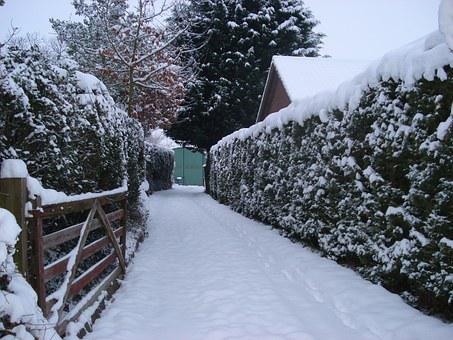The Benefits of a Heated Driveway
Ever felt yourself shudder at the thought of having to shovel, plow or de-ice your drive? Then investing in a heated driveway could change your life! So, is it really worth it?
We discuss the heated driveway concept, costs and key benefits below. Read on to find out more if installing one is right for you!
How Do Heated Driveways Work?
The concept behind a heated driveway to melt snow and prevent ice accumulation is fairly simple. There are two key types of heated driveway – water powered, or electric.
Water powered – Tubes are laid beneath the driveway that radiate heat, powered by your domestic boiler. This water may be mixed with an anti-freeze solution and circulated through the tubes which then radiates upwards, preventing snow and ice accumulation.
Electric – Electric cables are laid beneath your driveway and radiate heat upwards towards the surface of your drive.
Both manual and automatic systems are available wich some automatic systems using smart sensors to detect snow and ice.

How Much Does a Heated Driveway Cost?
A heated driveway could cost between $1,300 and $7,500 for a new system. Of course, the final quote will depend on various factors including:
- The type of system you choose
- The size, shape and incline of your driveway
- Your electricity/water costs
- Your location
Weighing up your own labour time, or the cost of outsourcing…you can’t help but wonder how the cost-benefit ratio of that heated driveway investment might break down…

Other Factors to Consider
- Heated area: Consider how much of the driveway you’d like to be heated. Perhaps some areas are easier to shovel, maybe some parts accumulate more snow than others, or you may only wish the parts on an incline to be heated. Some cost savings can be gained here depending on the system chosen.
- Uplift: A heated driveway can change the uplift effect on your current driveway. The product will lift the surface of your existing asphalt or concrete a few inches above ground level so surrounding work may need to be carried out to level the rest of your front yard.
- Concrete vs. Asphalt: Both materials have their pros and cons – if you live in an area where freezing temperatures are common, concrete may be a better option – it’s stronger than asphalt, and will better-withstand the weight of snow and ice.
- Commercial vs. Residential Usage: Considering the amount of use the driveway will receive daily may influence system types and costs. For example, business owners with several employees or heavy machinery will want to install a commercial system designed for durability, whilst residential systems are often smaller and more compact.
Benefits of Heated Driveways
1) Say Goodbye To Manual Snow Removal – If you live in an area prone to seasonal snowfall and ice, heated driveways are a great way to eliminate the requirement for regular manual snow removal, making it easier and safer to get on with your day-to-day activity.
2) A Safer Driveway – Keeping your drive free of snow and ice is certainly safer for both pedestrians and drivers eliminating the risk of injury or vehicle collisions.
3) Convenient and Fast – Automated or timed systems can help to reduce ice and snow buildup altogether, so you’ll never have to re-shovel fresh snow.
4) Reduced Maintenance Costs – heated driveways are designed to run for years without the need for any maintenance. Since there is no snow, dirt, or debris that can damage the system, you won’t have to spend any time maintaining it.
5) Reduced Environmental Damage – De-icing thoroughly often involves a little help from chemicals such as ethylene chloride (ETC), which prevents ice formation. These chemicals can pollute your yard and the wider environment. Heated driveways eliminate the need for such chemicals since the heat radiation will do it’s thing the natural way!
Thinking about a heated driveway for your home? Call +1 978-468-9793 to speak to one of the team for tailored advice and a free quote.








Follow Us